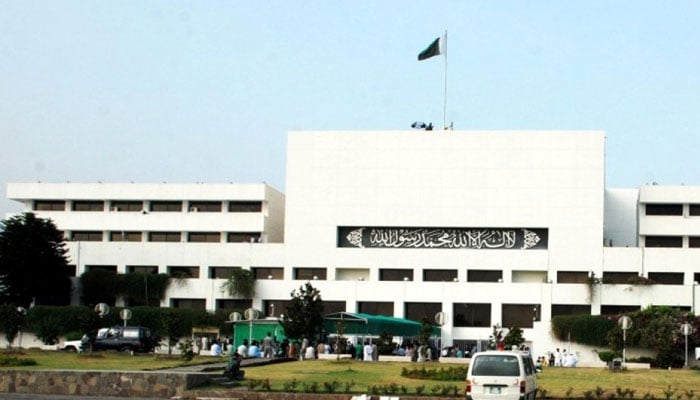Third rare parliamentary accord on crucial legislation on the cards
The impending parliamentary support to these amendments from the opposition parties barring exceptions is voluntary for their own reasons
ISLAMABAD: This may be the third rare consensus over the past eight months of the present government when all major and smaller parliamentary players may feature on the same page in approving a legislation.
The instant emerging agreement on the amendments in the army, navy and air force acts is not the result of any government effort but is the realisation among the parliamentary forces that the issue involved is sensitive that should not be subjected to any controversy. The impending parliamentary support to these amendments from the opposition parties barring exceptions is voluntary for their own reasons.
Since the issue of Gen Qamar Javed Bajwa’s extension/reappointment as the chief of the army staff came up, the opposition parties have stayed from doing politics on it. Even during the hearings in the Supreme Court on the challenge to the government notification extending his term, these political forces consciously refrained from passing any comments.
As the government announced to introduce a bill in parliament to give extension to Gen Bajwa, major opposition parties started expressing their support to the proposed legislation.
Pakistan Muslim League-Nawaz (PML-N) supreme leader Nawaz Sharif and Pakistan People’s Party (PPP) Chairman Bilawal stood for the proposed amendments but urged that the parliamentary procedures and rules should be followed and the legislation should not be rushed through the legislature.
As a general rule, when a law is scrutinised by a superior court, it always looks into the debate on it in parliament. It thus wants to read the mind of the legislators on its different clauses. At times, courts have called for the parliamentary debates for the purpose. The second instance of the parliamentary consensus emerged in May this year for the passage of the 26th constitutional amendment. The change provided for an increase in the number of seats for the erstwhile Federally Administered Tribal Areas (Fata) in the national and Khyber Pakhtunkhwa assemblies.
This was the first constitutional amendment approved by the National Assembly that came into existence in August after the general elections in July, 2018. It also extended the time of holding polls to the former tribal areas.
However, this amendment got stuck up in the Senate where it was never passed. Subsequently, it became redundant as the election in the tribal belt were held. This was a private members’ bill moved by Mohsin Dawar of the Pushtoon Tahaffuz Movement (PTM), which was supported by the ruling alliance and all the opposition parties alike. This happened for the first time that a private bill was owned by all the parliamentary players and unanimously passed.
The third consensus happened on an amendment to the Elections Acts, 2017, in March, 2019 which raised the number of members from two to three of a bench of the Election Commission of Pakistan (ECP) to hear different matters.
It authorised the ECP to constitute a bench comprising its three or more members to hear and decide complaints, applications, petitions or appeal. Earlier, only one bench can be constituted since the total number of members of the ECP, including the chief election commissioner is five. The ECP was facing immense difficulty in disposing of higher numbers of such complaints, petitions or appeals through a single bench. Hence, the amendment was necessitated to facilitate the ECP for constitution of more benches to effectively dispose of the matters coming before it.
-
 Chinese New Year Explained: All You Need To Know About The Year Of The Horse
Chinese New Year Explained: All You Need To Know About The Year Of The Horse -
 Canadian Passport Holders Can Now Travel To China Visa-free: Here's How
Canadian Passport Holders Can Now Travel To China Visa-free: Here's How -
 Glen Powell Reveals Wild Prank That Left Sister Hunting Jail Cells
Glen Powell Reveals Wild Prank That Left Sister Hunting Jail Cells -
 Edmonton Weather Warning: Up To 30 Cm Of Snow Possible In Parts Of Alberta
Edmonton Weather Warning: Up To 30 Cm Of Snow Possible In Parts Of Alberta -
 'A Knight Of The Seven Kingdoms' Episode 5: What Time It Airs And Where To Stream
'A Knight Of The Seven Kingdoms' Episode 5: What Time It Airs And Where To Stream -
 Amy Schumer Drops Cryptic Message On First Valentine Amid Divorce
Amy Schumer Drops Cryptic Message On First Valentine Amid Divorce -
 Savannah Guthrie Sends Desperate Plea To Mom Nancy Kidnapper
Savannah Guthrie Sends Desperate Plea To Mom Nancy Kidnapper -
 NBA All-Star 2026 Shake-up: Inside The New USA Vs World Tournament Format
NBA All-Star 2026 Shake-up: Inside The New USA Vs World Tournament Format -
 Warner Bros Consider Reopening Deal Talks With Paramount, Says Reports
Warner Bros Consider Reopening Deal Talks With Paramount, Says Reports -
 Andrew Mountbatten Windsor Faces Future With UK MPs, Says Expert
Andrew Mountbatten Windsor Faces Future With UK MPs, Says Expert -
 Eva Mendes Shared Bedroom Photos For Ryan Gosling On Valentine’s
Eva Mendes Shared Bedroom Photos For Ryan Gosling On Valentine’s -
 Shamed Andrew Told 'nobody Is Above The Law' Amid Harrowing Silence
Shamed Andrew Told 'nobody Is Above The Law' Amid Harrowing Silence -
 Gisele Bundchen Melts Hearts With Sweet Bike Ride Glimpse Featuring Son
Gisele Bundchen Melts Hearts With Sweet Bike Ride Glimpse Featuring Son -
 Prince William Found Meghan Markle ‘quite Refreshing’ At Start
Prince William Found Meghan Markle ‘quite Refreshing’ At Start -
 Kate Middleton Knew Should Could Not Be ‘voice Of Reason’ With Prince Harry
Kate Middleton Knew Should Could Not Be ‘voice Of Reason’ With Prince Harry -
 Rihanna Has Wardrobe Malfunction At A$AP Rocky Fashion Show
Rihanna Has Wardrobe Malfunction At A$AP Rocky Fashion Show




